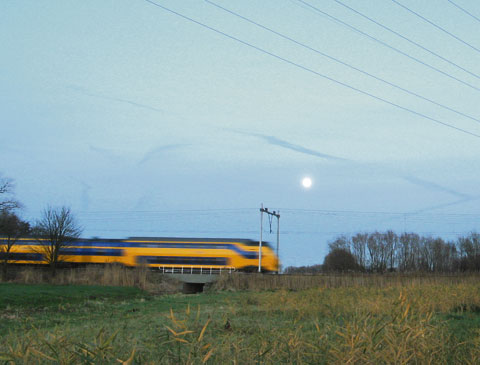For all of us annoyed lately by trains running late, Dr Francesco Corman has the solution: his mathematical model can be used to minimise the propagation of delays.
Few people may have noticed, but since last Sunday railway traffic has changed some. Just as it does every year in December, NS, the national rail service company, published the new timetable for the coming year. This year’s changes – slightly more trains running between Groningen and Leeuwarden, for instance, and more high-speed Fyra trains – fit on a single sheet of paper.
And while these changes may seem simple to incorporate into the present schedule, according to train traffic researcher, Dr Francesco Corman (faculty of Civil Engineering & Geosciences), it will take NS and ProRail (which manages the railway infrastructure) months to work it all out. “They’re probably already working on the schedule for 2012,” he says.
But what takes months for NS and ProRail to do, Dr Corman can do in minutes or even seconds. With his mathematical model, he can run through all possible combinations of desired train movements in regions of the country and decide which schedule is most efficient. Last week Dr Corman defended his dissertation, entitled ‘Real-time railway traffic management: dispatching in complex, large and busy railway networks’.
The model can come in handy when problems occur on the track, such as when switches become frozen, which happened on a large scale a few weeks ago. Another problem ProRail had to cope with recently was a fire in the traffic control centre in Utrecht, resulting in train delays occurring all across the country. “My model makes it is possible to minimize the propagation of delays caused by these problems,” Dr Corman adds.
One of the main sources of a railway system’s unreliability is the fact that trains have limited possibilities for overtaking along lines; rather, they must follow each other’s path sequentially, until an overtaking or passing track is reached. Because of this, interaction delays propagate very quickly. A certain amount of slack is included in the timetable to absorb slight delays, but if a train is seriously delayed the domino effect kicks in.
By performing online adjustments during operations however, it becomes possible to minimize disturbances. “The trick is to think wisely about the chain of events you want to set in motion,” says Dr Corman, whose model can help calculate millions of different options.
“My model could help the guys in the traffic control centres. When they choose a solution the model has offered, they’ll know that by doing so they will not be creating troubles for their colleagues in another part of the country.”
Of course there are some assumptions behind this model: one is that ProRail knows the location and speed of every train at every second. “At the moment it doesn’t,” Dr Corman notes. “ProRail only knows
between which two traffic signals along the track the trains are located. And it doesn’t know anything about the speed. The NS knows these things, but at the moment they’re not sharing this information, and even if they would, ProRail isn’t equipped to handle all these data.”
According to Dr Corman, ProRail is not very keen on investing in such operations at the moment: “It takes some time before you would see the results of these investments. ProRail has had so many problems lately that they’re now focused on ameliorations in the short term.”
Still, Dr Corman believes ProRail deserves to be cut some slack. “It’s true that the infrastructure is outdated,” he explains, “but that is if you compare it with other infrastructure systems, like the air traffic system for instance. But compared with other countries in Europe, the railway system in Holland is extremely dense and well organized.”
Volgens het ISO draagt medezeggenschap positief bij aan een goed bestuur, de kwaliteit van het onderwijs en draagvlak onder studenten. Wel betreurt het ISO dat de voorwaarden rondom de collegegelden voor de tweede studie niet in de wet zijn opgenomen.
Verruiming
Het ISO is zeer tevreden met de verruiming van de rechten voor de medezeggenschap. Met name het adviesrecht op het instellingscollegegeld en het instemmingsrecht op het profileringfonds hebben een duidelijke meerwaarde, vinden de verenigde studentenorganisaties. Door middel van het profileringfonds kunnen bijvoorbeeld bestuurlijk actieve studenten (financieel) worden ondersteund.
Over de invulling en vormgeving van medezeggenschap bestaan verschillende inzichten. Het ISO vindt dat er een duidelijke scheiding moet zijn tussen het uitvoerende orgaan (college van bestuur), het toezichthoudende orgaan (raad van toezicht) en de medezeggenschap. Zo kunnen maatregelen en genomen beslissingen goed worden getoetst, omdat er tussen deze drie organen geen vage grenzen bestaan.
Assessor
Het ISO is daarom altijd kritisch geweest over het idee ‘studentassessor’ om de medezeggenschap versterken. Er zijn weliswaar praktijkvoorbeelden waarbij het inzetten van een raadgevende student goed blijkt te werken en dat juicht het ISO toe. Het ISO is alleen geen voorstander om dit in de wet te regelen, want medezeggenschap gebeurt op basis van vertrouwen en strookt niet met een wettelijk voorgeschreven assessor.
Volgens het ISO is het nu al mogelijk om in samenspraak met het cvb een studentassessor in te stellen, dus als een medezeggenschapsraad dit graag wil, dan kan dit in overleg altijd nog geregeld worden. In plaats van de assessor heeft minister Plasterk toegezegd het initiatiefrecht voor medezeggenschapsraden uit te breiden. Dit is iets waar het ISO zich altijd voor heeft ingezet en het zal dit ook blijven doen.
Collegegeld
Wat betreft het instellingscollegegeld voor tweede studies lijkt de storm tijdelijk te zijn gaan liggen: door een drie jaar durende subsidieregeling hebben ook de HBO-raad en de VSNU aangegeven zich aan het bekostigingsakkoord uit 2007 te houden.
Hierin staat dat studenten die tijdens hun eerste studie (bachelor of master) aan hun tweede studie beginnen, het recht op het wettelijke (lage) collegegeld behouden. Echter, voor de studenten voor wie wel het instellingscollegegeld geldt, is het van groot belang dat de studentmedezeggenschap hier adviesrecht over heeft. Dit laatste is nu dus ook het geval.



Comments are closed.